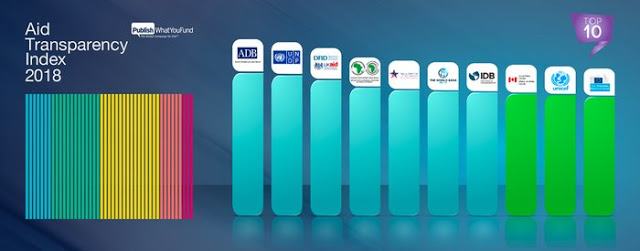The 2018 Aid Transparency Index Report (ATI), has ranked African
Development Bank (AfDB) 4th among 45 development organisations that share
transparent and open data on project impact, result and evaluation.
Development Bank (AfDB) 4th among 45 development organisations that share
transparent and open data on project impact, result and evaluation.
A statement signed by AfDB Chief Communication Officer, Mr
Chawki Chahedi on Wednesday in Abuja, said the 2018 ATI report had lifted the
bank by six positions since 2016.
Chawki Chahedi on Wednesday in Abuja, said the 2018 ATI report had lifted the
bank by six positions since 2016.
According to Chahedi, ATI has been the only independent
organisation measuring transparency in the world’s major development and
humanitarian agencies.
organisation measuring transparency in the world’s major development and
humanitarian agencies.
“The improved ranking reflects the bank’s operational
capabilities, the efficacy of its systems and processes, including a strict
adherence quality reporting, disclosure of its programmes, projects, aid and
financial interventions.’’
capabilities, the efficacy of its systems and processes, including a strict
adherence quality reporting, disclosure of its programmes, projects, aid and
financial interventions.’’
He said that it was a laid down procedure that organisations
provide information on the objectives of their operations.
provide information on the objectives of their operations.
“But only four Development Finance Institutions (DFIs) like the
Asian Development Bank, the Inter-American Development Bank, the World Bank and
AfDB publish details of their pre-project impact appraisals, evaluations and
review documents and results.’’
Asian Development Bank, the Inter-American Development Bank, the World Bank and
AfDB publish details of their pre-project impact appraisals, evaluations and
review documents and results.’’
The statement also quoted AfDB President, Dr Akinwumi Adesina as
saying “proactive stakeholders relations and governance anchored on
transparency are critical and at the heart of the impact-driven work that makes
the AfDB Africa’s leading DFIs’’.
saying “proactive stakeholders relations and governance anchored on
transparency are critical and at the heart of the impact-driven work that makes
the AfDB Africa’s leading DFIs’’.
“The latest ranking on the global aid transparency index
reflects the bank’s alignment to its strategic priorities and unwavering
commitment to Africa’s development and transparency agenda.”
reflects the bank’s alignment to its strategic priorities and unwavering
commitment to Africa’s development and transparency agenda.”
The Bank said a signatory to the International Aid Transparency
Initiative (IATI) since April 2011, the bank had recently launched a new
projects portal, publishing data according to IATI’s international standards on
transparency.
Initiative (IATI) since April 2011, the bank had recently launched a new
projects portal, publishing data according to IATI’s international standards on
transparency.
It said the aim was to make information about its development
spending easier to access, use and understand.
spending easier to access, use and understand.
The bank said open data supporters had endorsed the index,
adopted by the United Nations, African Union, European Union, the United States
government and other international and regional bodies.
adopted by the United Nations, African Union, European Union, the United States
government and other international and regional bodies.
Chahedi, however, noted that the report identified some
challenges to the open data momentum, which includes the shrinking “civic
space’’ needed for citizens and Civil Society Oorganisations (CSOs) to engage
in decision making.
challenges to the open data momentum, which includes the shrinking “civic
space’’ needed for citizens and Civil Society Oorganisations (CSOs) to engage
in decision making.
The chief communication officer said the report also listed
increasingly scarce assistance from development partners, and the changing
development landscape, adding that they pose a fresh set of fiscal, regulatory,
technical and ethical challenges for global transparency efforts.
increasingly scarce assistance from development partners, and the changing
development landscape, adding that they pose a fresh set of fiscal, regulatory,
technical and ethical challenges for global transparency efforts.





